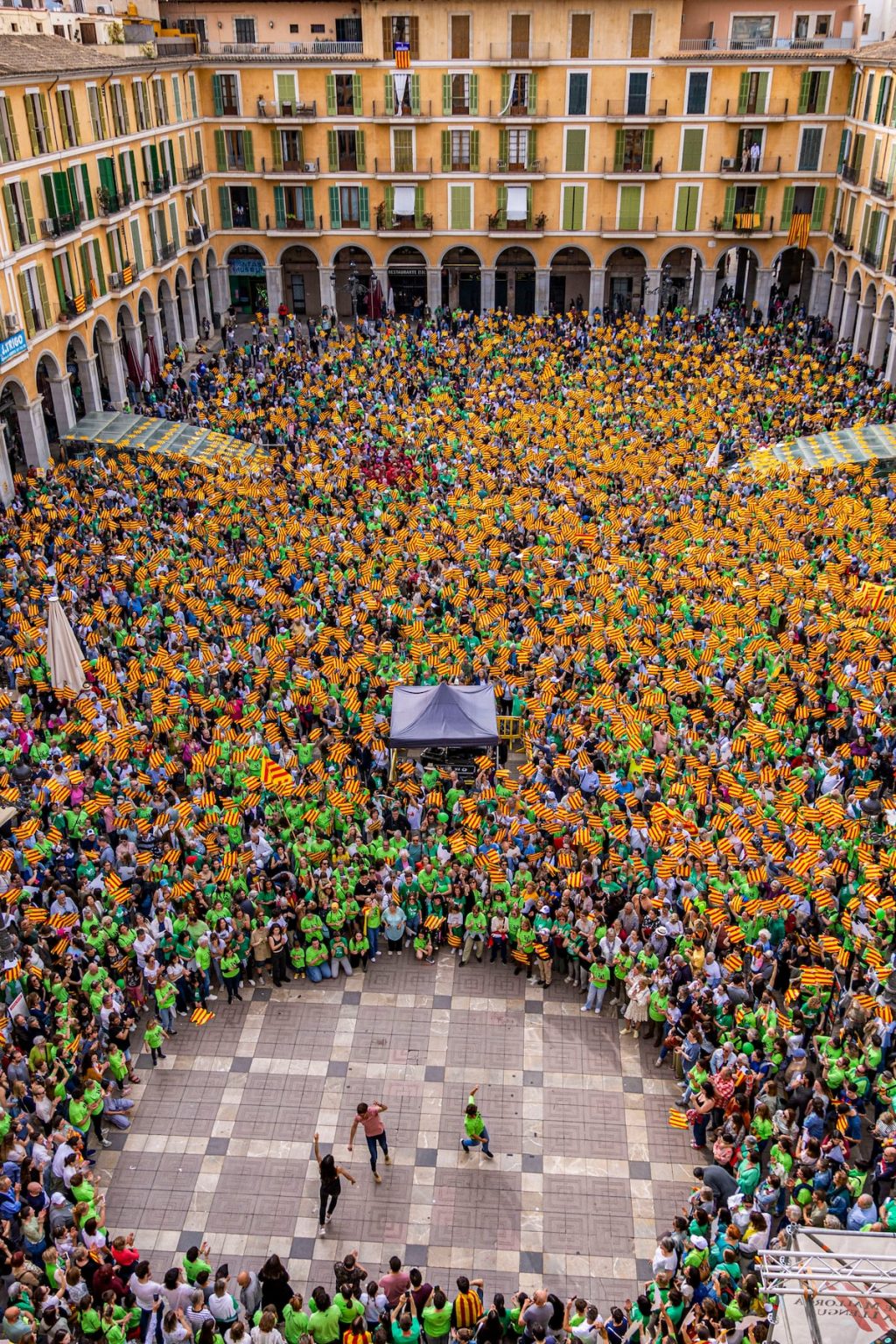The language policies implemented by the PP in the short ten months of Marga Prohens’ government in the Balearic Islands have sparked protests in defense of Catalan. Thousands of people gathered in the Plaza Mayor of Palma on Sunday to defend the islands’ language and protest against the policies of marginalizing Catalan in the islands promoted by the Prohens government with the support of their external allies from Vox. The green shirts, symbol of the educational wave that opposed the government of José Ramón Bauzá in 2013 for its measures against Catalan in schools, once again took to the streets of the Balearic capital in a massive Diada per la Llengua organized by the social entities Obra Cultural Balear and Joves de Mallorca per la Llengua under the slogan “Yes to the Language!”.
During the reading of the manifesto, singer Miquela Lladó stated, “There have been many restrictions, impositions, and prohibitions that Catalan speakers have suffered for doing something as natural and simple as expressing ourselves in our language.” The organizers demanded a commitment from institutions to the recovery of the language and an end to policies against Catalan. The president of Obra Cultural Balear, Antoni Llabrés, urged the government’s president Marga Prohens to choose between being “with the social majority of the people of Mallorca” or continuing to be “ignominiously kneeling before fascism.” They called for a correction from the Prohens government to break away from the policies that are negatively impacting the Catalan language.
Tensions between the Prohens government and certain social sectors in defense of the language have been increasing in recent months due to the implementation of language policies proposed by Vox and embraced by the Popular Party to secure the support of the far-right. The first clash came with the downgrade of Catalan from a requirement to a merit for public health job applications. Subsequently, the Prohens government faced opposition from the education sector by accepting Vox’s proposal to allow the choice of Spanish as the language of instruction. This measure has been widely rejected by educational unions and institutions, who speak of a plan for “linguistic segregation” that will divide students based on the language they study in. The latest chapter that has angered language advocacy groups is Vox’s intention to promote the Balearic dialect in island institutions, following the Casa Real’s distinction of an academic entity opposed to the unity of Catalan that promotes this dialect.
The most massive demonstration in recent years was attended by the main opposition leaders in the islands, including the current Secretary General of the PSIB-PSOE and President of the Congress of Deputies, Francina Armengol. The rally in the Plaza Mayor hosted the final stage of the “flama per la llengua,” the flame for the language that has traveled through many towns and cities in the islands in defense of Catalan. The Local Police estimated the number of attendees at 7,000 people, while the organizers claim there were more than 40,000 attendees. The opposition parties have called on the PP to make a “turnaround” in their language policies, although the PP denies any backtracking.
The parliamentary spokesman for the PP, Sebastià Sagreras, emphasized that his party voted in favor of the Autonomy Statute that recognizes Catalan as the islands’ own language and denied that there would be a retreat. The opposition is demanding that the PP dissociate itself from Vox’s language policies. PSIB-PSOE deputy Marc Pons urged Prohens not to distance herself from the reality of the streets and to reflect and change the government’s direction to avoid further social tension, as the PP has made attacks on the language a key element of the legislature. For Més per Mallorca parliamentary spokesman Lluís Apesteguia, it is essential for the Popular Party to look beyond and listen to voices other than themselves and the fascism they have chosen as their travel companion.


